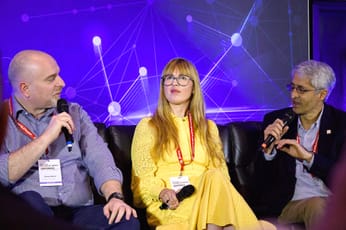
Can Apple Music save a middle-aged man from the music of his youth?
Apple Music arrived last night, and with it Beats 1 – a new, global music channel. And I’m not just quite hopeful that it’ll be god; I’ve been actively listening to it and enjoying it.
Like many people in their early 40s, I’ve begun to drift away from music. I still listen to it – all the time, in fact – but my range of music is barely expanding. The few albums I’ve bought over the last few years have either been classics I didn’t already own, or new albums from old, familiar voices. My music development has stalled.
It’s easy to see why – I’m time-poor, and the form of my life doesn’t tend to put me in situations where I’m encountering or discussing new music. And so, I stick with what I know.
This is rather painfully pointed up by the “For You” section of new version of iTunes, which takes my often eclectic taste and makes it depressingly familiar:

The journey to discovery
This is one reason I’ve never signed up for Spotify long-term. I have all the music I like already, and can stream it to my devices. My listening’s sorted – and I’ve never found a good way of using Spotify to discover new music. It’s great at facilitating access to the things I know I want, but hopeless at allowing me to discover the unexpected.
And that’s the problem Apple claims to be solving.
David Hepworth, writing in The Guardian, makes the argument that there isn’t a problem which Beats 1 actively solves, largely based on Apple executive quotes that suggest they’re trying to address fragmentation.
This fragmentation is only a problem for the music business. Music fans don’t have any problem that they need Apple to solve. The music industry on the other hand needs a mass audience to hype.
That’s very much a view from within music, though. There are plenty of us – people who enjoy music, but whose life has drifted away from active discovery of new music – that probably don’t count as “music fans” in his use of that term. That doesn’t put us in the same category as the people he disparages as “like John and Kayleigh from Peter Kay’s Car Share” – people happy to just sing along to golden oldies – though. We are happy to encounter the unfamiliar; we just have fewer opportunities to do so.
The fragmentation of music – the ever-deepening niches that you might find hard to dig your way into – has made music discovery much less simple for the time poor. And that describes most of us in the early stages of middle age.
I’ve found some approaches that work for me – buying SoundSupply drops, or judicious use of Shazam while out and about – but they’re not enough to truly broaden my range of experiences with music.
Apple Music: curation from two angles
Apple Music offers us two approaches to resolving that. Beats 1 is a surprisingly eclectic listen. In one half hour stretch I heard tracks from the last few weeks, the last few months, from the early 2000s and the 1960s. The DJs I’ve heard so far are skilled at putting new music in the context of old music – and that’s great for those of us who cherish our inner “28-year-old, madly over-compensating in the shadow of approaching middle age”, in Hepworth’s words (again). I have no intention of going gracefully into that middle-aged musical night – and I feel no shame in that, either.
What I’m enjoying more – possibly because it opens me to new music without being quite so full-on – are the heavily curated channels you can pull up. In particular, the activity-based lists have been a great way to find music to, say, write to, while throwing some unexpected musical choices my way.

I really like the fact that there are human beings – expert human beings – underlying this work. Algorithms are fantastic things, and are great for all sorts of situations. I actually appreciate the fact that Facebook tends to make good choices about what to show me, for example. But they are pretty terrible at both contextualising – giving me the story and connections between apparently unrelated tracks – and throwing up the unexpected. The nature of algorithms (at least the ones we have now) is to show us more of what we want – and that tends to narrow our sphere of encounters, not broaden it. That’s most worrying when it comes to political issues, as Eli Pariser explores in his fascinating book The Filter Bubble: What The Internet Is Hiding From You, but it can lead to a shallowing of cultural experience, too.
In many ways, it would be hypocritical of me not to appreciate human curation of music. I’ve always tried to expose my readers to new and unexpected ideas through this blog – just not the mainstream of thought in whatever area I’m currently most interested. It’s a skill I understand, work to improve – and respect in others. There are algorithmic systems that attempt to do some of that lifting – Fraggl, which my friend Neil Perkin is involved with – is one example of that. But this isn’t an either/or situation. Humans complementing algorithms, algorithms complementing humans gives us a richer experience.
The test will be in three month’s time, when the free period expires. Will I be finding enough value in this to carry on paying? That will depend on how much I feel my musical circle expanding again.
Sign up for e-mail updates
Join the newsletter to receive the latest posts in your inbox.










